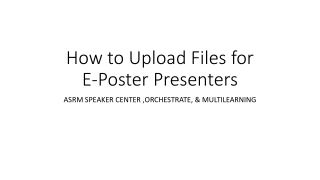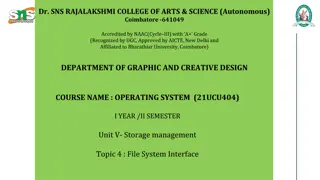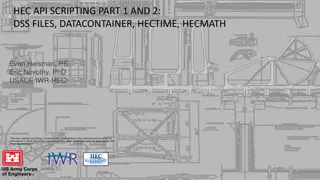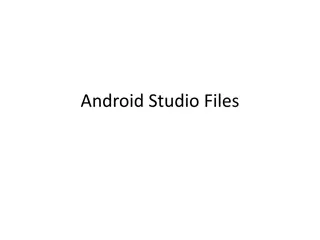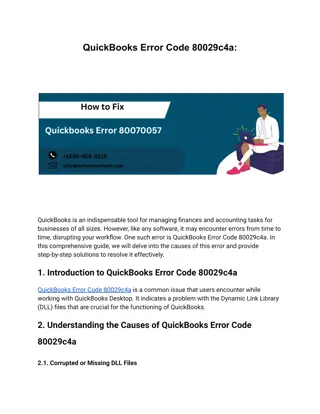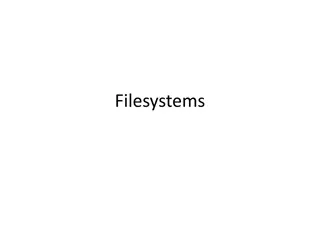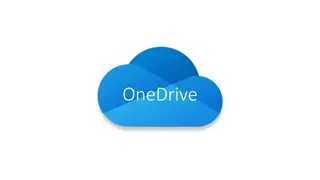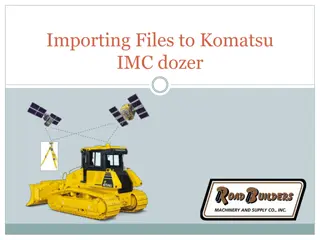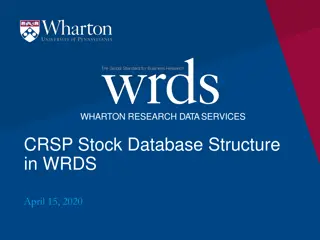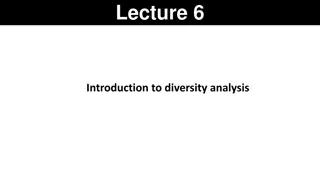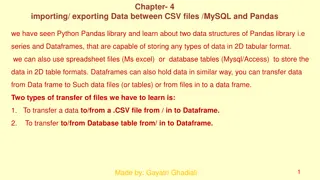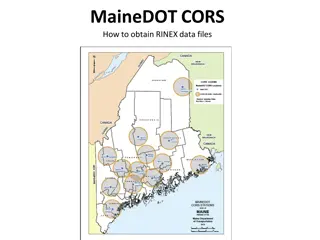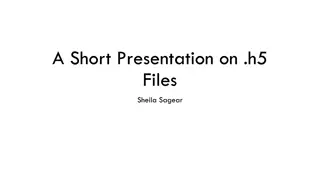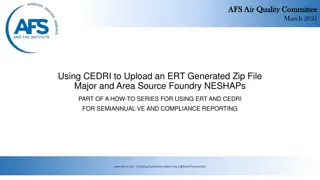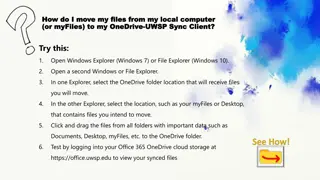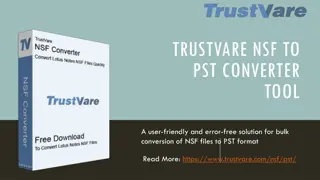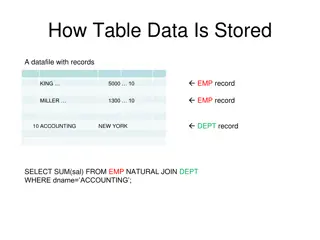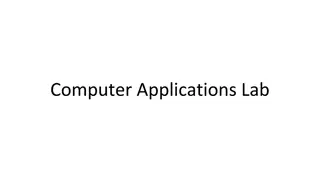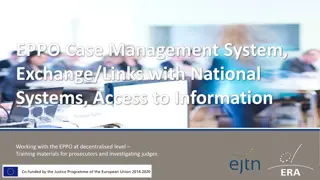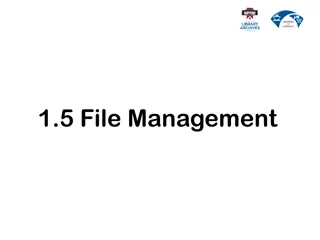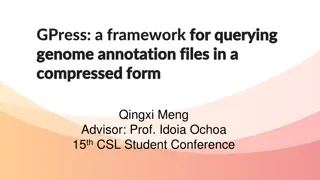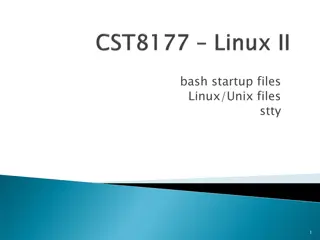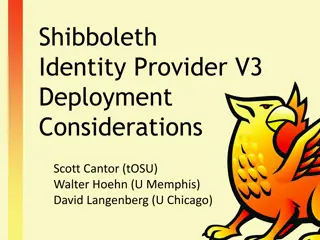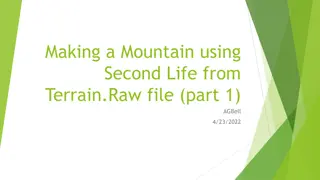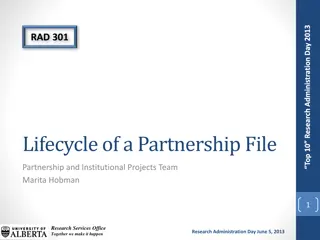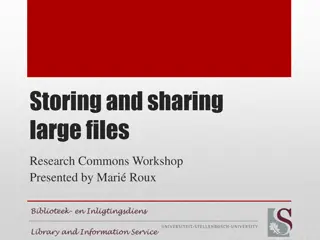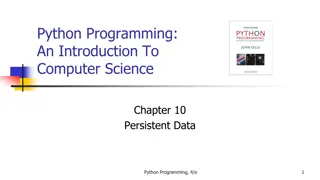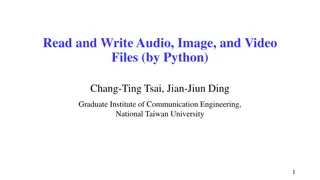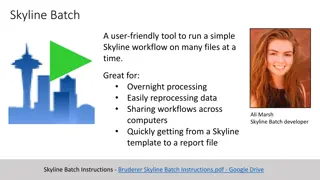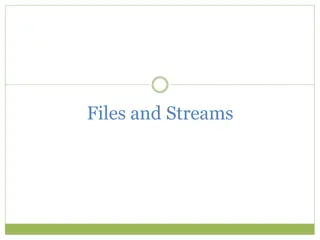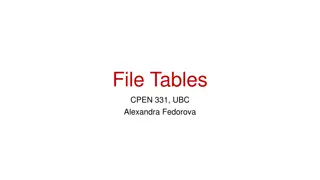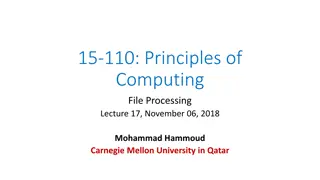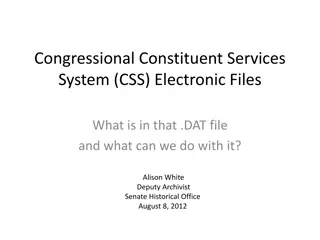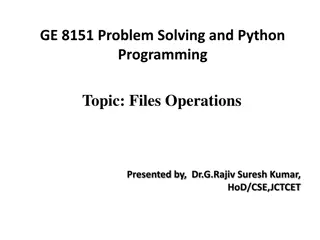How to Upload E-Poster Files for ASRM Speaker Center
Learn how to upload your E-Poster files for ASRM Speaker Center efficiently. Follow the three-step process to confirm participation, upload your E-Poster, and record/upload audio. Access your Speaker Center using login credentials, select Presenter Intent tab, and upload your files by clicking on th
0 views • 14 slides
Understanding File System Interface in Operating Systems
The file system interface is a crucial aspect of any operating system, providing users with a method for storage and access to data and programs. It comprises files for data storage and a directory structure for organizing and managing files within the system. File attributes like name, identifier,
0 views • 8 slides
Overview of HEC API Scripting Part 1 and 2: DSS Files, DataContainer, HecTime, HecMath
This report delves into the HEC API scripting involving DSS files, DataContainer, HecTime, and HecMath. It covers important classes, accessing files, and the distinction between DataContainers and HecMath objects. Additionally, it compares Python and Java, highlighting their differences in interpret
2 views • 28 slides
Android Studio Files
Explore the essential components of Android application development, including the structure of Android Studio files, creating an Android application, and the anatomy of an Android application. Dive into the folders, files, and descriptions that make up the foundation of Android app development.
0 views • 18 slides
Resolving QuickBooks Error Code 80029c4a: A Comprehensive Guide
QuickBooks Error Code 80029c4a: \nQuickBooks Error Code 80029c4a is a common issue indicating problems with DLL files. Causes include missing or corrupted DLL files, antivirus interference, incomplete installations, or Windows registry issues. Symptoms include frequent freezing, crashes, and error m
2 views • 5 slides
Understanding Filesystems: A Comprehensive Overview
File systems provide a structured approach to storing and organizing data on secondary storage devices. They involve logical organization of files, directories for grouping related files, sharing data between users, and managing permissions. Files contain data with attributes like size, ownership, a
3 views • 29 slides
Understanding PGN Files and Chess-Results Integration
PGN files, short for Portable Game Notation, are essential for downloading and playing through chess games. Organizers can use PGN files to share game data with the media and facilitate live tournament broadcasting. Learn how to export, upload, and adjust PGN files for seamless integration with Ches
4 views • 13 slides
Comprehensive Guide to Using OneDrive for Accessing, Storing, and Collaborating on Documents
Learn how to access OneDrive on the web and desktop, work with documents, save files, manage file activities, and collaborate efficiently. Discover various features such as uploading files, creating folders, searching documents, and sharing files with others.
2 views • 13 slides
Guide to Importing Files to Komatsu IMC Dozer
Comprehensive guide on how to import various files to a Komatsu IMC dozer, including important information on file formats, steps to follow for copying and selecting files, loading TIN files, setting surfaces, and more. Learn how to efficiently manage project files and add new surface files to enhan
2 views • 14 slides
Understanding the WHARTON.RESEARCH.DATASERVICES CRSP Stock Database Structure in WRDS
Explore the structure of WHARTON.RESEARCH.DATASERVICES CRSP stock database in WRDS, including types of updates, time-series vs event files, and how to merge them efficiently. Learn about annual, quarterly, and monthly update subscriptions, as well as different types of CRSP files. Dive into examples
0 views • 14 slides
Understanding CP and MV Commands in Unix/Linux
CP and MV commands in Unix/Linux are essential for copying and moving files or directories. CP is used to copy files with various options for different scenarios, while MV is used to move or rename files. Learn examples and practical usage of these commands to efficiently manage your files on the te
0 views • 5 slides
Understanding Diversity Analysis Using VCF Files
This lecture introduces the analysis of population diversity using VCF files. It covers file types, manipulation techniques, and key tools like vcftools and bcftools. Learn about the differences between vcf.gz and vcf files, how to convert between them, and open, compress, and index VCF files for an
0 views • 13 slides
Importing and Exporting Data Between CSV Files, MySQL, and Pandas
In this chapter, we explore how to transfer data between CSV files, MySQL databases, and Pandas using Python. We learn about the CSV file format, creating CSV files, and reading data from CSV files into Dataframes. This chapter provides insights into efficient data management techniques using Pandas
1 views • 11 slides
Obtaining RINEX Data Files from MaineDOT CORS
Obtain RINEX data files from MaineDOT CORS by following a few simple steps. Login and password are required, and guest login is no longer an option. The data is collected at one-second intervals and is available for Real-Time-Kinematic (RTK) users. To access the files, visit the provided link, selec
0 views • 17 slides
Understanding H5 Files: A Practical Overview
H5 files, which stand for Hierarchical Data Format 5, store data in a structured manner, commonly used for storing weights in machine learning models. Exploring the contents of H5 files and dealing with unknown hierarchies can be challenging but essential tasks in data analysis. This presentation pr
0 views • 8 slides
Step-by-Step Guide for Utilizing CEDRI to Upload ERT Generated Zip Files for Foundry NESHAPs
This detailed guide provides a step-by-step tutorial on using CEDRI to upload ERT generated zip files for Foundry NESHAPs reporting, specifically focusing on major and area source foundries. It covers essential processes from logging in to CDX to selecting a preparer, creating a report, and uploadin
0 views • 16 slides
Step-by-Step Tutorial on Saving to Your Learner's Drive
Learn how to save files to your learner's drive with this comprehensive tutorial. Discover two different methods to save, search, and organize your files efficiently. Follow the easy steps outlined in the tutorial, complete with visual guides, and make saving to your learner's drive a breeze. Start
0 views • 7 slides
Move Files to OneDrive Using UWSP Sync Client
Learn how to easily move files from your local computer to OneDrive using the UWSP Sync Client. Follow step-by-step instructions with visual aids, ensuring a smooth transfer process. Verify the presence of the Sync Client icon and get started organizing your files efficiently.
0 views • 14 slides
Practical Guide for Uploading Files to Agency Web Portal
Explore useful tips and guidelines for uploading files to the agency web, empowering authorized users to efficiently manage warrant information, revenue files, and general ledger transactions. Understand the process of requesting upload capabilities and essential information such as file formats, te
0 views • 14 slides
Convert HCL Notes NSF Files to Outlook PST Format With TrustVare Software
You can convert HCL Notes NSF files to Outlook PST format with TrustVare Software without a single error. This is one of the best solutions for technical and non-technical users to convert bulk emails from NSF to PST files without a single error. Thi
6 views • 9 slides
Understanding Database Storage Structures and Tablespaces
Explore the physical and logical structures of databases, including how data files are stored, the role of control files and redo log files, tablespaces and data files organization, SYSTEM and SYSAUX tablespaces, actions with tablespaces, segments, extents, blocks, and more. Learn how different elem
0 views • 16 slides
Organizing Files and Folders in Computer Applications Lab
Learn how to create folders, store files, rename items, and use specific programs to save new files in a computer applications lab setting. Discover tips on organizing documents efficiently and using common commands like cut, paste, and copy to manage your digital workspace effectively.
0 views • 11 slides
EPPO Case Management System: Information Processing and EDP Case Files
Chapter VII of Regulation 2017/1939 delves into the intricacies of information processing at the EPPO central level, encompassing data handling, storage, and access. The regulation outlines the guidelines for EDP case files and the applicable rules when processing information, emphasizing adherence
0 views • 14 slides
Understanding Scanner Class in Java: Reading User Input and Processing Files
The Scanner class in Java's java.util package allows reading input from the keyboard or files. It looks for tokens in the input, reads different types of values, and has methods like nextInt() and nextLine(). You can also read from files by creating a File object. Learn how to use Scanner to interac
0 views • 21 slides
Mastering File Management for Efficient Organization
Dive into the world of file management to understand the nuances between files and folders, saving methods, file types recognition, and essential operations like creating, renaming, copying, cutting, pasting, dragging, and dropping files. Discover the importance of keeping your files organized for e
0 views • 40 slides
GPress: A Framework for Querying Genome Annotation Files in Compressed Form
Genome projects generate large GFF files which require significant storage space. GPress offers a solution by compressing GFF files while allowing quick searches and random access. The framework addresses challenges faced by current GFF utilities, providing a more efficient approach to managing and
0 views • 24 slides
Understanding Bash Startup Files and Shell Customization
Learn how to customize your shell behavior in Linux/Unix by setting environment variables, aliases, and shell options using bash startup files. Discover the importance of ~/.bash_profile and ~/.bashrc in shell initialization and configuration. Understand how login and non-login shells execute comman
0 views • 13 slides
Shibboleth Identity Provider V3 Deployment Considerations and Key Differences for V2 Deployers
Configuration in V3 involves smaller files divided by topics, use of Velocity templates for interfaces, and separate read-only system files for safe upgrades. The V2 to V3 upgrade brings changes in XML files like attribute-resolver.xml and relying-party.xml. Clustering options and quick new features
0 views • 9 slides
Introduction to BED Files: An Overview of Browser Extensible Data Format
BED (Browser Extensible Data) files are commonly used for annotating genomic sequences by specifying ranges on chromosomes. They consist of required fields like chromosome name, start and end positions, and optional fields for additional information such as name, score, strand, and color representat
0 views • 11 slides
Exploring Terrain Raw Files in Second Life for Mountain Creation
Delve into the world of terrain.raw files in Second Life to craft a mesh model of a mountain, uncovering insights from forums, tutorials, and helpful tools like Blender and scripts for terrain conversion. Discover techniques to manipulate RGB channels, adjust elevations, and convert files for creati
0 views • 6 slides
Insights into Partnership Files and Project Management
Partnership files play a crucial role in managing complex research projects involving multiple sponsors, financial aspects, and reporting requirements. This article delves into the definition, types of projects, common files, and stages of a partnership file, shedding light on the intricacies of res
0 views • 30 slides
Efficient Ways to Store and Share Large Files
Explore the world of file hosting services for storing and sharing large files, focusing on Google Drive, Dropbox, and SkyDrive. Discover their similarities, security features, and sharing capabilities. Learn about SSL support, file encryption, and the ability to share files with ease. Dive into the
0 views • 19 slides
Introduction to File Processing in Python Programming
Understanding the basics of file processing in Python is crucial for opening, reading, and writing files. This chapter covers text files, binary data, persistent data, and the use of the pickle module to store and load Python objects from files. Learn about the role of files in persistent data stora
0 views • 109 slides
Python Tutorial: Reading and Writing Audio, Image, and Video Files
This Python tutorial covers the process of reading and writing audio files, including installation of necessary modules, acquiring audio parameters, plotting waveforms and spectrums of audio files, and more. Detailed examples and images are provided to guide you through the steps.
0 views • 25 slides
Efficient Skyline Batch Workflow Tool for Processing Multiple Files
Utilize Skyline Batch, a user-friendly tool developed by Ali Marsh, to run simple Skyline workflows on multiple files efficiently. This tool is ideal for overnight processing, reprocessing data easily, and sharing workflows across different computers. Quickly transform Skyline templates into report
0 views • 4 slides
Introduction to Files and Streams in Programming
Understanding files and streams is essential in programming for storing and processing data. Files provide a permanent way to store information, and streams help in reading and writing data sequentially or in parts. Learn about different types of files, such as text and binary files, and how to work
0 views • 31 slides
Understanding File System Calls and Operations in Operating Systems
Explore the concepts of file system calls, opening files, reading from files, setting file offsets, closing files, and maintaining file states in an operating system. Learn how to interact with files efficiently while understanding the underlying mechanisms and necessary actions for file handling.
0 views • 21 slides
Introduction to File Processing in Python
Python offers various functions for handling files, allowing users to create, read, update, and delete files. By using the open() function, files can be created or existing ones opened with different modes like reading, writing, or appending. Understanding file handling is essential for storing data
0 views • 20 slides
Accessing and Managing Congressional Constituent Services System Electronic Files
Learn about the contents of .DAT files in the Congressional Constituent Services System (CSS) Electronic Files, including how to open and manipulate them using Microsoft Office applications like Excel. Discover accompanying documentation and tips for handling large data sets effectively.
0 views • 14 slides
Understanding File Operations in Python Programming
Learn about files in Python programming and how to perform file operations such as opening, reading, and writing. Discover the differences between text files and binary files, along with key attributes of files in Python.
0 views • 25 slides
